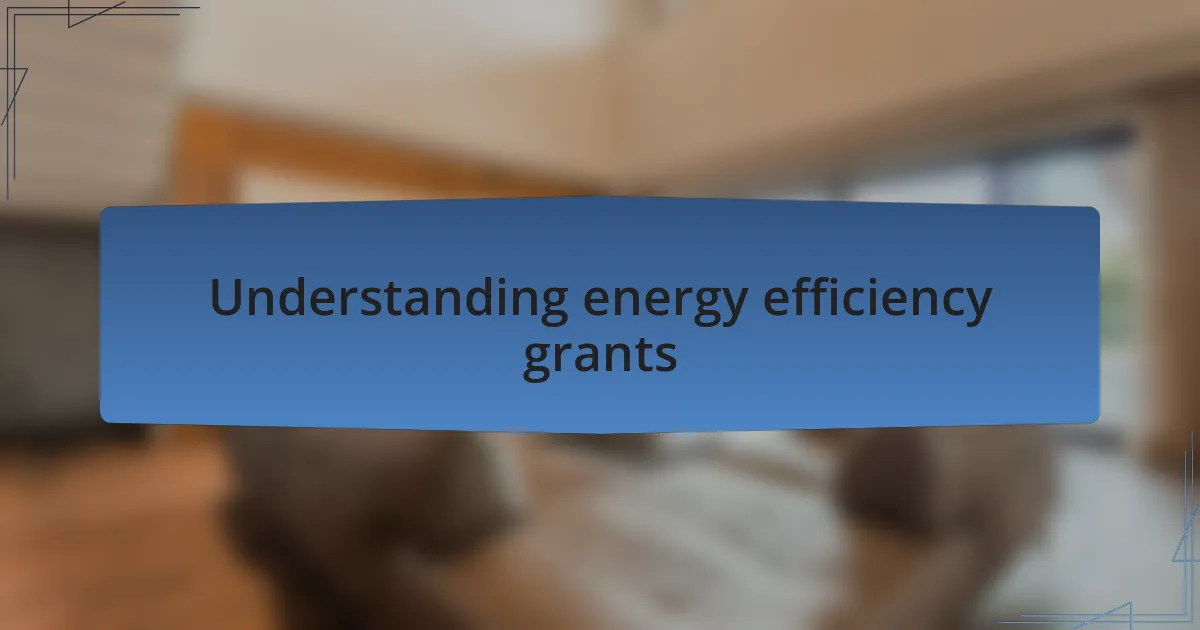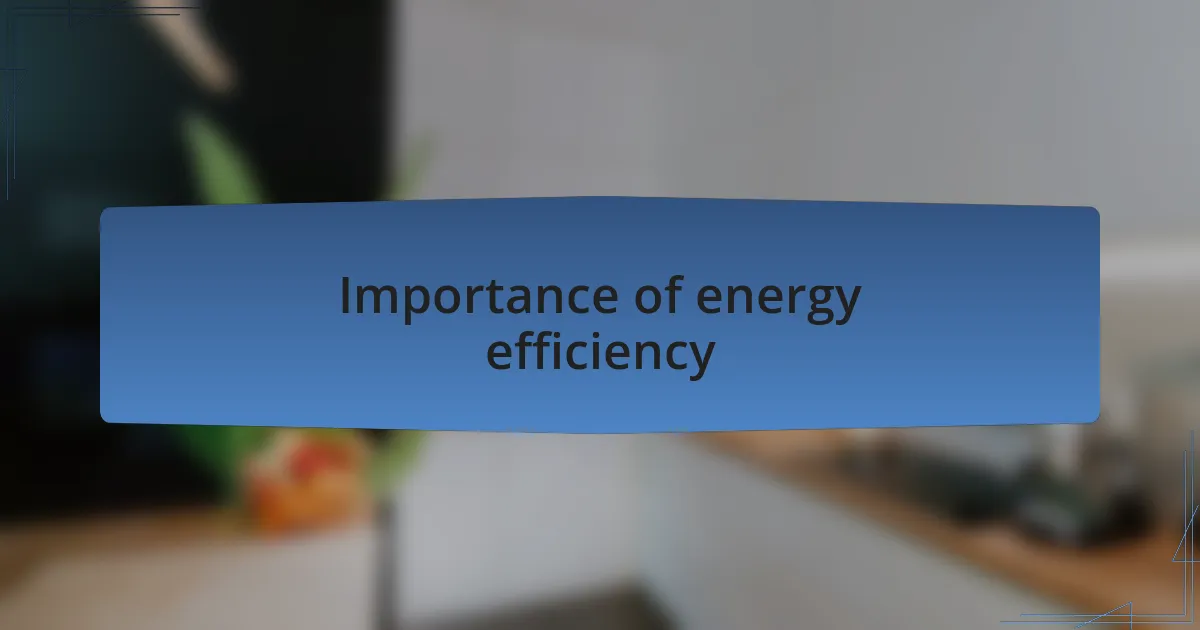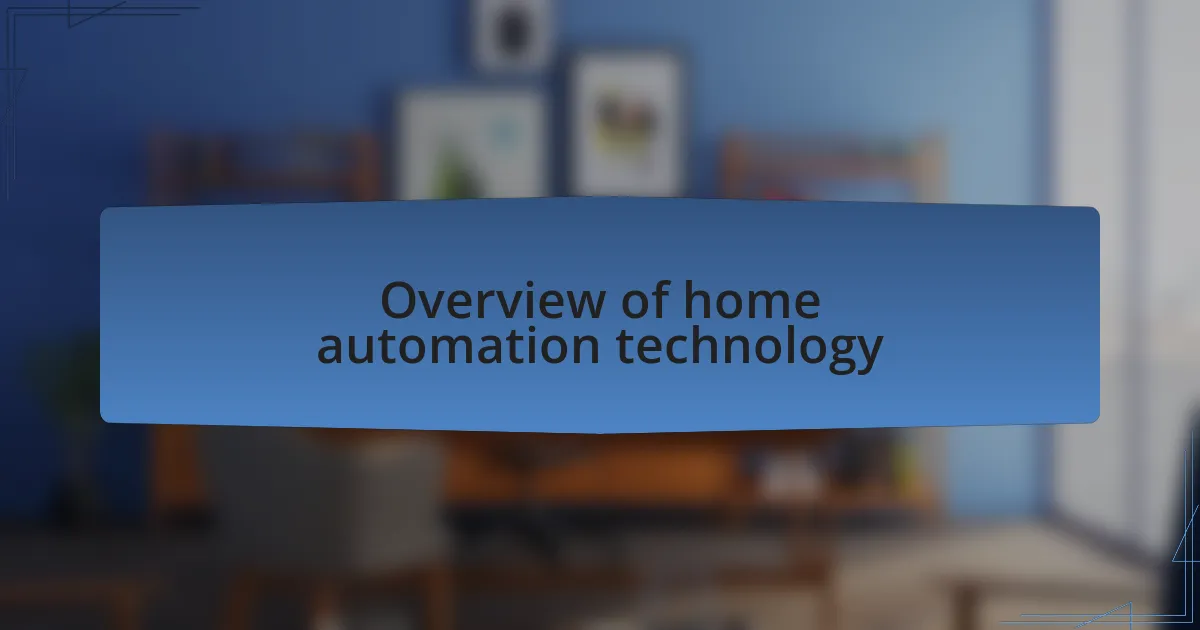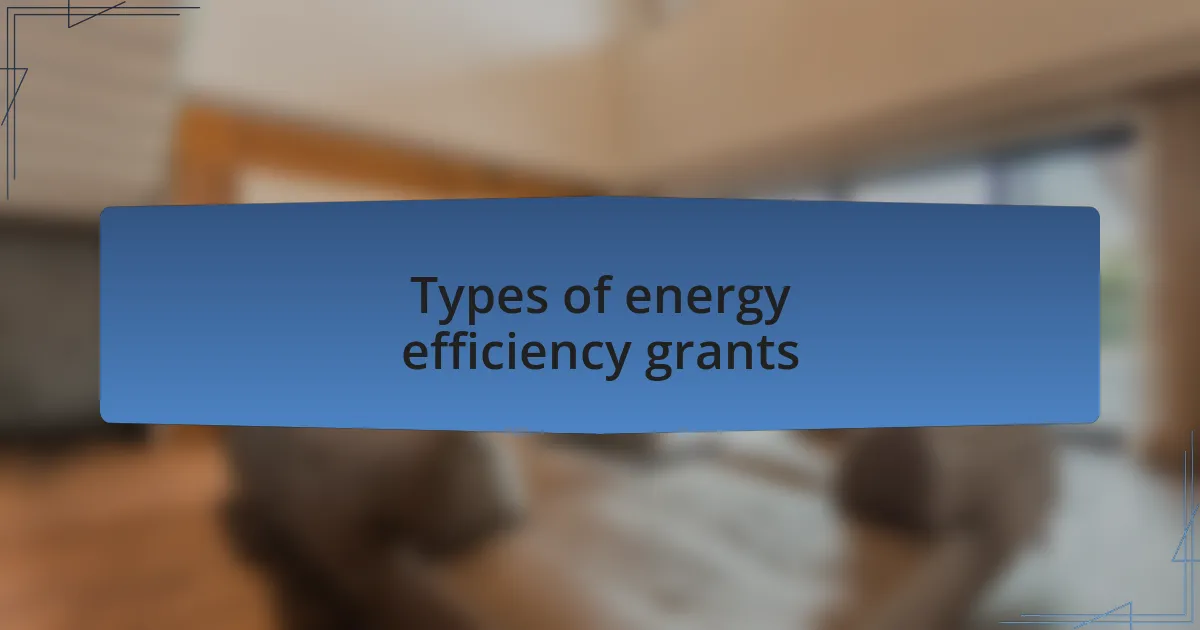Key takeaways:
- Energy efficiency grants provide financial incentives for homeowners and businesses to invest in energy-saving improvements, significantly reducing costs for upgrades like heating systems and solar panels.
- Adopting energy-efficient practices not only lowers utility bills but also contributes to economic growth and job creation in the green technology sector.
- Home automation technology enhances energy efficiency and convenience, encouraging users to adopt more sustainable habits effortlessly.
- Various types of energy efficiency grants are available, catering to different needs, including renewable energy installations and support for low-income households, promoting inclusivity in sustainability efforts.

Understanding energy efficiency grants
Energy efficiency grants are financial incentives offered by governments or organizations to encourage homeowners and businesses to invest in energy-saving improvements. I remember the excitement I felt when I first learned about these grants; it was like discovering a hidden treasure that could make my home more sustainable while reducing my energy bills. What if I told you that some of these programs could cover a significant portion of the costs for upgrading your heating system or installing solar panels?
Applying for these grants can sometimes feel overwhelming, but I assure you, it’s worth the effort. When I embarked on the journey of enhancing my home’s energy efficiency, I discovered that many resources provide step-by-step guidance. Isn’t it amazing how a little research can connect you to potential funding that ultimately transforms your living space into an eco-friendly haven?
Additionally, many grants are designed to foster long-term energy efficiency, making it a win-win situation. Each time I reflect on my own experiences, I feel a surge of motivation. Imagine waking up each day knowing that you are reducing your carbon footprint while saving money! Energy efficiency grants can create a ripple effect, leading to not just individual savings, but a collective positive impact on our environment.

Importance of energy efficiency
When it comes to energy efficiency, the importance cannot be overstated. I remember the moment I switched to energy-efficient appliances; it was as if I had unlocked the door to a world where sustainability was not just an ideal, but a tangible reality. This simple change led me to not only lower my monthly bills but also to feel a deeper sense of responsibility for our planet’s future. Isn’t it empowering to know every small decision contributes to a larger purpose?
Additionally, energy efficiency fuels innovation and economic growth. During my research into various home upgrades, I stumbled upon the connections between improved energy efficiency and job creation in the green technology sector. It dawned on me that making our homes more sustainable doesn’t just benefit us as individuals; it creates opportunities for an entire industry dedicated to advancing these solutions. How could anyone overlook the impact of their choices on job growth and the economy?
Moreover, energy efficiency plays a crucial role in enhancing comfort and quality of life at home. I recall the drastic difference I experienced after installing better insulation; my home felt cozier and more inviting. It struck me how intertwining comfort with energy savings is a win-win scenario. Why wouldn’t you want to live in a space that’s both comfortable and efficient?

Overview of home automation technology
Home automation technology transforms everyday living, making it more convenient and efficient. I vividly remember the first time I programmed my smart thermostat; it was astonishing to see how quickly my home adapted to my routine. This newfound control not only made my life easier but also dramatically enhanced my energy efficiency.
At its core, home automation integrates various devices to work seamlessly together, often providing remote control through smartphones or voice-activated systems. I recently set up a smart lighting system that adjusts automatically based on the time of day. It struck me how effortless this made my daily habits and how, in turn, it helped reduce my energy consumption without any extra effort on my part.
What I’ve discovered about smart home devices is that they don’t just help manage energy use; they promote a lifestyle change. Reflecting on my experiences, I’ve found myself more mindful of my habits. Can you imagine a scenario where your home encourages you to be greener simply through automated features? That’s the power of home automation technology—it engages and empowers us to think about our consumption in a whole new light.

Types of energy efficiency grants
When it comes to energy efficiency grants, there are several types that homeowners can pursue, each catering to different needs. For instance, I’ve come across grants aimed specifically at upgrading appliances or HVAC systems. Thinking back to when I replaced my aging furnace, I remember feeling a mix of excitement and apprehension about the cost. Fortunately, a local grant program eased some of that burden, and I was able to make an upgrade that enhanced my home’s efficiency and comfort.
There are also grants focused on renewable energy installations, like solar panels or wind turbines. A few years ago, I attended a community meeting where they outlined a state-funded program offering financial assistance for solar systems. I remember how enthusiastic the audience was, knowing that this wasn’t just about saving money—it was a step towards a sustainable future. Exploring options for these grants makes me wonder: what could be possible if more people tapped into this funding?
Moreover, some programs specifically target low-income households or energy efficiency retrofits, which can significantly impact those who need it most. I once volunteered at an energy workshop where we helped families find grants to insulate their homes better. Witnessing how this transformed their living situations and reduced energy bills felt deeply rewarding. It’s clear that grants play a vital role in fostering inclusivity in energy efficiency efforts, ensuring everyone has a chance to benefit from smarter home technologies.